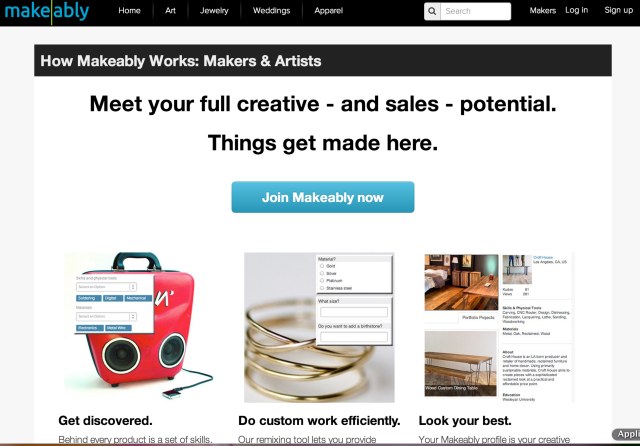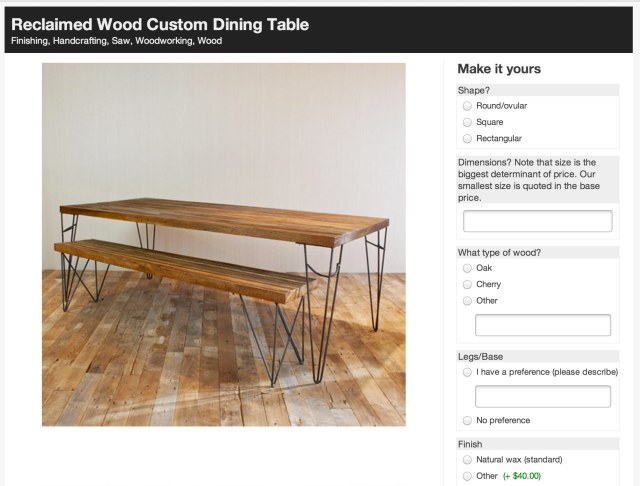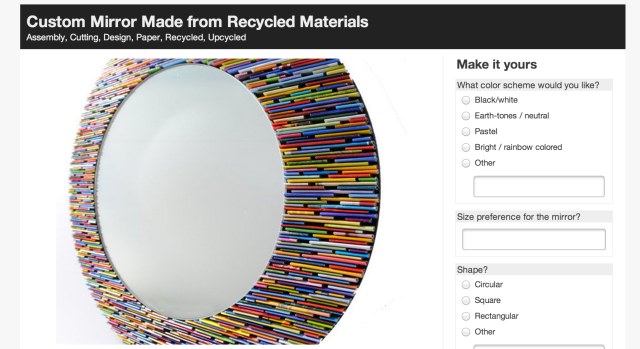Brooklyn-based custom-made goods marketplace Makeably launched this past fall as a way to connect buyers with makers and other artisans who can craft unique, one-of-a-kind items ranging from apparel to household goods and more. Today, the company is announcing a slight tweak to that earlier business model, as well as $650,000 in seed funding led by Great Oaks, with participation from 500 Startups and other angel investors.
Founded by ex-Googlers Ryan Hayward and Anastasia Leng, the angel investment included all of Leng’s former managers at Google, the co-founder tells us, as well as other Google and tech industry execs like Google X’s Obi Felten; Feedburner co-founder Steve Olechowski; Senior Director of Product Management at Flurry Rahul Bafna; PM Director of Google Display Advertising Christian Oestlien; Head of Innovation at TalkTalk Max Alexander; Director of Global Marcom for YouTube Anna Bateson; VP of Product Management and Cloud9 Wireless founder Sebastian Tonkin; VP & Head of Product Management, Visa U.K. and Ireland, Brendan Marry; and others.
The marketplace initially was reminiscent of CustomMade in that it also served as a resource for shoppers looking for custom goods. But today the company is relaunching version 2 of its website, which puts the focus more on what the startup is calling “remixes,” as opposed to the more direct requests for creations.
After the first six weeks of its public debut, Makeably pulled in $10,000 in transactional revenue, Leng says, but when the founders dug into the data they discovered that only around 5 to 10 percent of users were “power creators” — meaning those who came in with very specific ideas of what they wanted, and who generally weren’t constrained by a budget.
However, the other 90 percent were just “remixing” the reference-point products to their liking. “For example, they would see a design for a necklace they really liked and would say, ‘can I have this in gold instead of silver?’ or ‘can you make this as earrings instead of as necklaces?’,” explains Leng. “They were remixing along one or two dimensions instead of creating a one-off every single time.”
To better cater to the majority of the site’s users, a new version of Makeably has been under testing for a couple of weeks which now features items users can “remix” by selecting their own options and adding special requests via a “Make it yours” side panel to the right of the item. Here, buyers can choose from different materials, designs, sizes and other changes, as well as input any other detailed requests into a provided form.
Leng says that during the testing period, signs indicate this “remix” option is working. Bounce rates are down by half, there’s been an increase in visitors contacting buyers, and the average purchase price has gone up from around $20 to $30 to $80 to $100. The site is now on track to hit $100,000 in transactional revenue in the next month or two, she adds.
In addition, maker profiles are being augmented with structured data detailing their skill sets and materials they work with, while also allowing them to showcase photos of works in progress, workspaces or other projects they plan to work on. Buyers can click on “kudos” buttons to give their praise to these individuals, too, and in a few weeks, they’ll have enhanced profiles of their own, which will keep track of those clicks.
The team hopes that, going forward, Makeably can serve to help makers figure out how to expand beyond the creations they’ve already made in a way where they’re not having to predict what consumers want, putting it out there, then finding out that no one wants to buy it, says Leng.
The maker movement, combined with the increasing consumerization of 3D-printing technologies, and the growth of crafty marketplaces like Etsy are all pointing to a future where people will become more accustomed to ordering specialized items or simply becoming more involved in the “manufacturing” process in general. But Makeably is arriving during what’s still the early days of that larger shift, so the question it has is not one of whether the company is on the right long-term path, but rather one of timing.
“That is what keeps me up at night,” Leng admits. “It’s not whether ‘does this idea have legs?’ or ‘will this work?’ It’s ‘will we have enough time and runway to really prove our point?’,” she says. But things are changing fast. When the startup began fundraising efforts in January, investors were skeptical about the idea. Upon her return to San Francisco just three weeks ago, they had changed their tune entirely. “I think for the first time they felt like this is a way to make customization really scalable, and it’s not tied to 3D printing,” she says.



